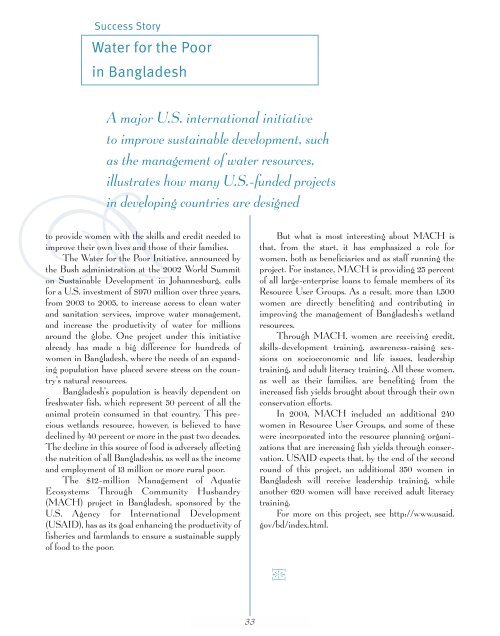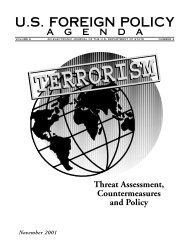Working for Women Worldwide - Embassy of the United States
Working for Women Worldwide - Embassy of the United States
Working for Women Worldwide - Embassy of the United States
You also want an ePaper? Increase the reach of your titles
YUMPU automatically turns print PDFs into web optimized ePapers that Google loves.
Success Story<br />
Water <strong>for</strong> <strong>the</strong> Poor<br />
in Bangladesh<br />
A major U.S. international initiative<br />
to improve sustainable development, such<br />
as <strong>the</strong> management <strong>of</strong> water resources,<br />
illustrates how many U.S.-funded projects<br />
in developing countries are designed<br />
zto provide women with <strong>the</strong> skills and credit needed to<br />
improve <strong>the</strong>ir own lives and those <strong>of</strong> <strong>the</strong>ir families.<br />
The Water <strong>for</strong> <strong>the</strong> Poor Initiative, announced by<br />
<strong>the</strong> Bush administration at <strong>the</strong> 2002 World Summit<br />
on Sustainable Development in Johannesburg, calls<br />
<strong>for</strong> a U.S. investment <strong>of</strong> $970 million over three years,<br />
from 2003 to 2005, to increase access to clean water<br />
and sanitation services, improve water management,<br />
and increase <strong>the</strong> productivity <strong>of</strong> water <strong>for</strong> millions<br />
around <strong>the</strong> globe. One project under this initiative<br />
already has made a big difference <strong>for</strong> hundreds <strong>of</strong><br />
women in Bangladesh, where <strong>the</strong> needs <strong>of</strong> an expanding<br />
population have placed severe stress on <strong>the</strong> country’s<br />
natural resources.<br />
Bangladesh’s population is heavily dependent on<br />
freshwater fish, which represent 50 percent <strong>of</strong> all <strong>the</strong><br />
animal protein consumed in that country. This precious<br />
wetlands resource, however, is believed to have<br />
declined by 40 percent or more in <strong>the</strong> past two decades.<br />
The decline in this source <strong>of</strong> food is adversely affecting<br />
<strong>the</strong> nutrition <strong>of</strong> all Bangladeshis, as well as <strong>the</strong> income<br />
and employment <strong>of</strong> 13 million or more rural poor.<br />
The $12-million Management <strong>of</strong> Aquatic<br />
Ecosystems Through Community Husbandry<br />
(MACH) project in Bangladesh, sponsored by <strong>the</strong><br />
U.S. Agency <strong>for</strong> International Development<br />
(USAID), has as its goal enhancing <strong>the</strong> productivity <strong>of</strong><br />
fisheries and farmlands to ensure a sustainable supply<br />
<strong>of</strong> food to <strong>the</strong> poor.<br />
But what is most interesting about MACH is<br />
that, from <strong>the</strong> start, it has emphasized a role <strong>for</strong><br />
women, both as beneficiaries and as staff running <strong>the</strong><br />
project. For instance, MACH is providing 25 percent<br />
<strong>of</strong> all large-enterprise loans to female members <strong>of</strong> its<br />
Resource User Groups. As a result, more than 1,500<br />
women are directly benefiting and contributing in<br />
improving <strong>the</strong> management <strong>of</strong> Bangladesh’s wetland<br />
resources.<br />
Through MACH, women are receiving credit,<br />
skills-development training, awareness-raising sessions<br />
on socioeconomic and life issues, leadership<br />
training, and adult literacy training. All <strong>the</strong>se women,<br />
as well as <strong>the</strong>ir families, are benefiting from <strong>the</strong><br />
increased fish yields brought about through <strong>the</strong>ir own<br />
conservation ef<strong>for</strong>ts.<br />
In 2004, MACH included an additional 240<br />
women in Resource User Groups, and some <strong>of</strong> <strong>the</strong>se<br />
were incorporated into <strong>the</strong> resource planning organizations<br />
that are increasing fish yields through conservation.<br />
USAID expects that, by <strong>the</strong> end <strong>of</strong> <strong>the</strong> second<br />
round <strong>of</strong> this project, an additional 350 women in<br />
Bangladesh will receive leadership training, while<br />
ano<strong>the</strong>r 620 women will have received adult literacy<br />
training.<br />
For more on this project, see http://www.usaid.<br />
gov/bd/index.html.<br />
Z<br />
33












